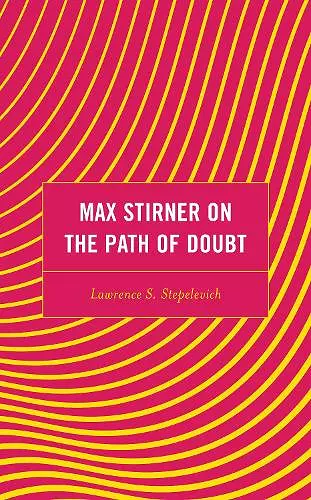Max Stirner on the Path of Doubt
Format:Hardback
Publisher:Lexington Books
Published:15th Dec '20
Currently unavailable, and unfortunately no date known when it will be back
This hardback is available in another edition too:
- Paperback£35.00(9781793636904)

Max Stirner on the Path of Doubt examines Stirner's incisive criticism of his contemporaries during the period from the death of Hegel, in 1831, to the 1848 German Revolution. Stirner's work, mainly the Ego and His Own, considered each of the major figures within that German school known as “The Young Hegelians.” Lawrence S. Stepelevich argues that for Stirner, they were but “pious atheists,” and their common revolutionary ideology concealed an ancient religious ground – which Stirner set about to reveal. The central doctrine of this school, that Mankind was its own Savior, was initiated in 1835 by the theologian, David F. Strauss's in his Life of Jesus , and it progressed with August von Cieszkowski's mystical recasting of history, followed by Bruno Bauer's absolute atheism and Ludwig Feuerbach's statement that “Man is God.” This soon found reflection in the “Sacred History of Mankind” declared by Moses Hess. Within a decade, the result was the secular reformulation of this theological ideology into the “Scientific Socialism” of Karl Marx and Frederick Engels. Although linked to it, Max Stirner was the most relentless and feared critic of this school. His work, never out of print, but largely ignored by academics, has inspired countless “individualists” set upon rejecting any form of religious or political “causes,” and finding Stirner's assertion that he had “set his cause upon nothing” took this as their own cause.
“This is an important and needed book which brings a lifetime of first rate scholarship to bear on Max Stirner’s thought, as well as the significant thinkers, critics and commentators who were active in his generation, just after the death of Hegel. While offering a well-painted picture of Stirner himself, it also astutely suggests the contemporary relevance of many of Stirner's preoccupations. The style is intelligent, very informed and informative. It evidences much impressive erudition, but it wears its scholarly learning lightly. The result is a very readable text, engaging, and illuminating, as well as being full of significant touches of wit and irony. Very warmly recommended.”
-- William Desmond, Villanova UniverISBN: 9781793636881
Dimensions: 241mm x 166mm x 20mm
Weight: 463g
226 pages